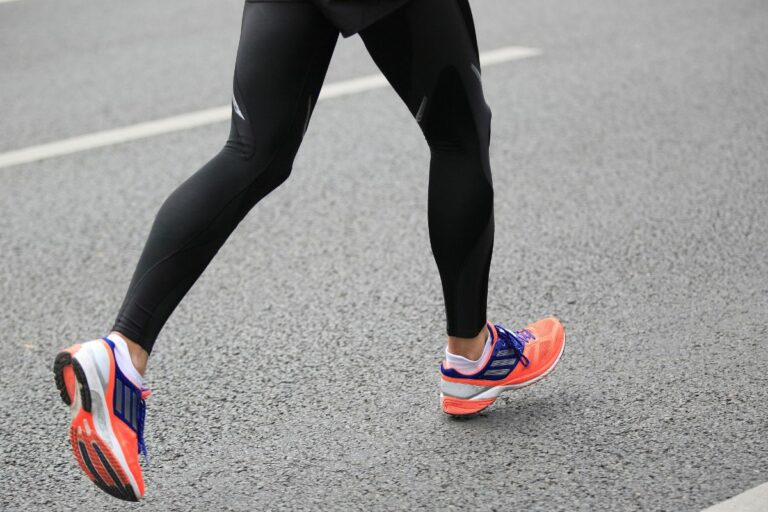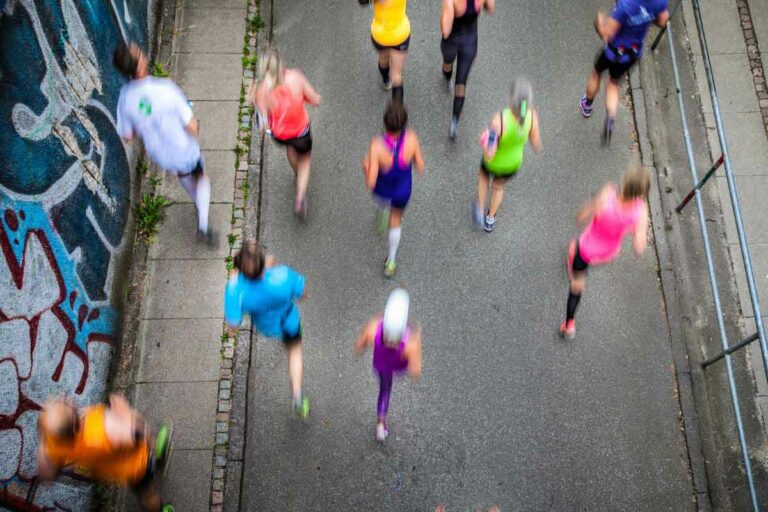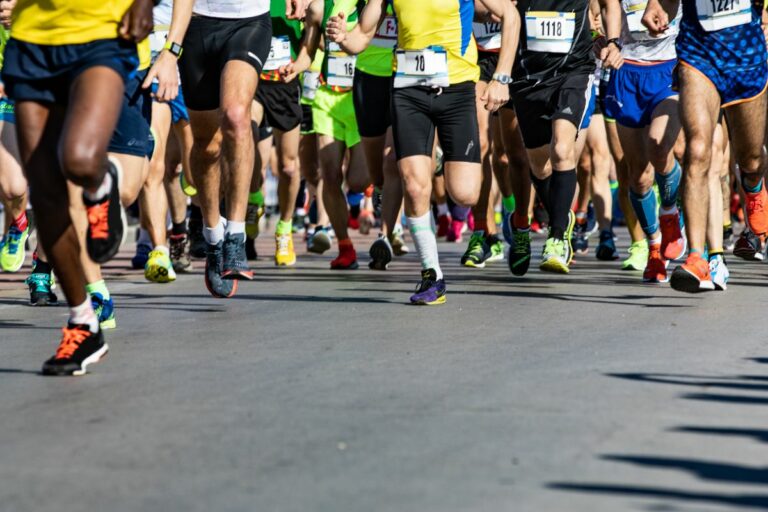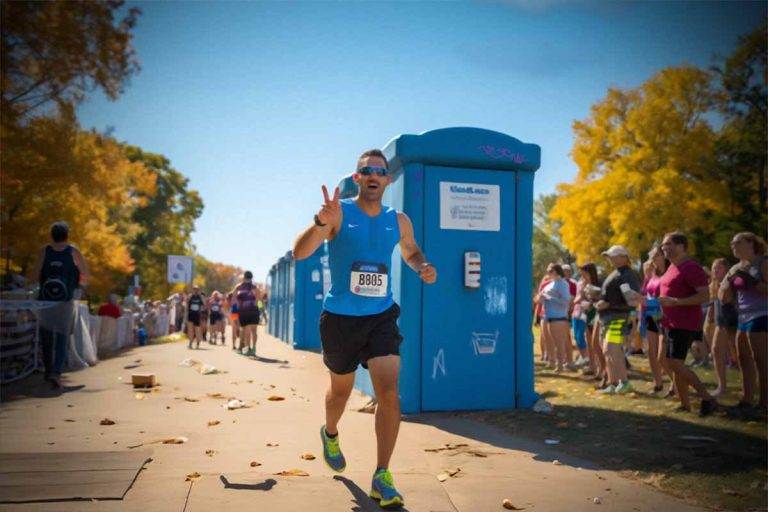Why Do Marathon Runners Poop Their Pants? How to Manage Runner’s Trots

There’s something incredibly admirable about watching marathon runners reach the finish line, while their loved ones cheer them on from the sidelines.
These athletes take the standard marathon distance of 26.2 miles, looking graceful as ever, despite the mental and physical challenges of such endurance.
However, during the intense race many runners experience unwanted bowel movements, and by that we mean, poop in the pants.
This is known as runner’s trots, with some referring to it as the Gingerbread Man. It is the sudden need to empty your bowel in the middle of a race.
What Is Runner’s Trots?
- Various gastrointestinal symptoms from nausea to cramps to flatulence to diarrhea.
- It may then become necessary to defecate urgently.
- Usually, it occurs during long-distance runs like marathons.
- Long-distance races may trigger symptoms in people with irritable bowel syndrome or food intolerances.
During running, several factors affect:
- The up and down motion of running can upset the bowels.
- Blood is diverted from the intestines to the legs and arms during a run.
- Dehydration.
Several runners have been known to finish a race with poop running down their legs. Their bowels are not giving them enough notice to pull over and stop.
However, some feel too driven to finish the race without reaching their PB, so they finish it anyway with a nasty surprise dripping down their legs – DEDICATION at its finest!
This article will be discussing why this happens, and certain steps you can take to avoid this traumatizing accident.
What Causes Runner’s Trots?
Although unpleasant, bowel discomfort is very common when it comes to taking part in an exercise of intense endurance. There are a number of factors that can cause it.
1. Motility Disorders
Colonic motility is how often one goes to the toilet, and how soft their stool is.
This is naturally increased when running, as there is a surge of hormones in the stomach lining as a result of all the bouncing around.
2. Bouncing During Running
Following on from the above, all that bouncing around from running can also increase mucosal permeability. This controls the movement of materials from inside the gastrointestinal tract, and passes them out to the rest of the body.
This also leads to loosened stools, which in turn leads to a SUDDEN need to go to the bathroom.
Slow down if you feel the problem arising. If you walk instead of pushing through, you’ll have more control over the urgency. It is possible to even walk through the whole marathon.
3. Blood Circulation
In addition to both of the points mentioned above, when the body is involved in physical stress, blood is moved away from the organs that aren’t being used at that time. Circulation is going more to the areas that need it, such as the legs.
The intestines are then receiving limited blood flow, which can cause cramps and sudden bowel movements.
4. Muscle Control
Normally individuals are able to control their anal sphincters until they reach a bathroom.
But when you are in the middle of intense activity, such as a marathon, it is very difficult to voluntarily keep the muscle closed. Your body is too focused on the muscles in your legs, etc.
It is possible to experience these gastrointestinal issues during a run, without soiling yourself.
The accident happens once you lose control of both the exterior and interior sphincter muscles by the end of the anal canal.
If the volume of waste is high enough, the muscle that normally prevents the poop from escaping relaxes, resulting in a full-blown accident.
Therefore, it is a combination of all of the above, that goes on inside a marathon runner’s body, that can contribute to pooping during a race.
Things You Can Do To Prevent It

This unfortunate, embarrassing, and down-right traumatizing event is mainly out of our control. But there are a few things we can do, post-run, to reduce the chances of it happening.
1. Limit Certain Food Products
Avoiding certain foods before your run is crucial for keeping your bowels and intestines healthy whilst you complete your run.
Fructose, fat, fiber, and protein are often associated with gastrointestinal problems in runners.
Dehydration then adds to the problem (which is inevitable during a marathon), so avoiding these kinds of foods, as well as fatty, high-calorie foods three hours before your run can reduce the issue.
You should also avoid caffeine before your run, as it is known to irritate your bowels and upset your stomach.
2. Avoid Certain Medications
Aspirin and other NSAIDs (Non-steroidal anti-inflammatory drugs), such as Ibuprofen, have been known to speed along intestinal permeability, which causes the gastrointestinal issues all runners want to avoid.
Therefore, it is advised to not take any of these medications in the days leading up to the marathon.
3. Timing Of Meals
Timing your meals carefully can significantly REDUCE the risk of a bowel movement occurring when you’re in the middle of a race.
When you eat a meal or even a snack, your body wants to clear out what you’ve just eaten to make room for more food.
Therefore, the movement of your intestines increases after eating, which leads to a bowel movement.
It is therefore advised that you eat at least two or three hours before your run. Your body has enough TIME to pass the food through your intestines, which will lead to you going to the bathroom.
This means you’ll begin your run with a clear digestive system, which will significantly reduce the risk of an unwanted bowel movement during your run.
4. Warm-Up Jog
If you find it very difficult to run without making a stop in the bathroom, then warm-up carefully.
Go for a proper warm-up jog around your block before your big run. It will enable you to empty your bowels before the real thing.
5. Wear Comfortable Clothes
If you are running in clothes that are too tight around your waist, this can also cause discomfort and irritate your bowels.
When choosing what to wear for your marathon, select running tights or shorts that are loose-fitted and comfortable. This will also make the run more enjoyable for you.
6. Know the Race Route
Research the facilities of the route before the race. Plan where to pee and where you can take other breaks in advance. The first restrooms along the route are usually the most crowded.
Be prepared for surprises. Just in case you need toilet paper, consider carrying some with you.
7. Energy Gels
The problem may be related to the composition of your sports drink. Or, if you use gels during competitions, these can be to blame for tummy problems.
Never try anything new on race day (gels, water supplements, foods). Do the research, and test the option that suits you well before the event.
8. Imodium
In competitions or special events, you should try an anti-diarrheal medicine available at the drug store, such as Imodium. It slows down gut movement and reduces water in the stool.
You can take it 1-3 hours before the race. Determining the correct dosage is a very personal matter. How the stomach behaves is very individual. By experimenting, you will find out whether 1 or 2 tablets are enough.
Getting everything out of your system before a run is essential. However, Imodium is a good choice right before a marathon if a mid-race stop is not convenient.
The morning of the race is not the best time to test Imodium for the first time. Try it out during your training runs to see how it affects you.
9. Talk To Your Doctor
Lastly, what if you keep having uncontrollable bowel movements during your runs, and none of the above is helping?
Then it is best to seek advice from your doctor. There could be an issue you are not aware of.
The Bottom Line
In summary, the body is going through an intense form of physical excursion during a marathon, and this can lead to irritation in the intestines. That can sometimes cause uncontrollable bowel movements.
As mentioned in this article, there are a few things you can do before your run to reduce the chances of this happening. However, there are times when there is nothing you can do.
Pre-event jitters and STRESS can contribute to a runner’s trot. A good night’s sleep and comprehensive training can help.
It is best to just grin and bear it – you won’t have been the only one!






